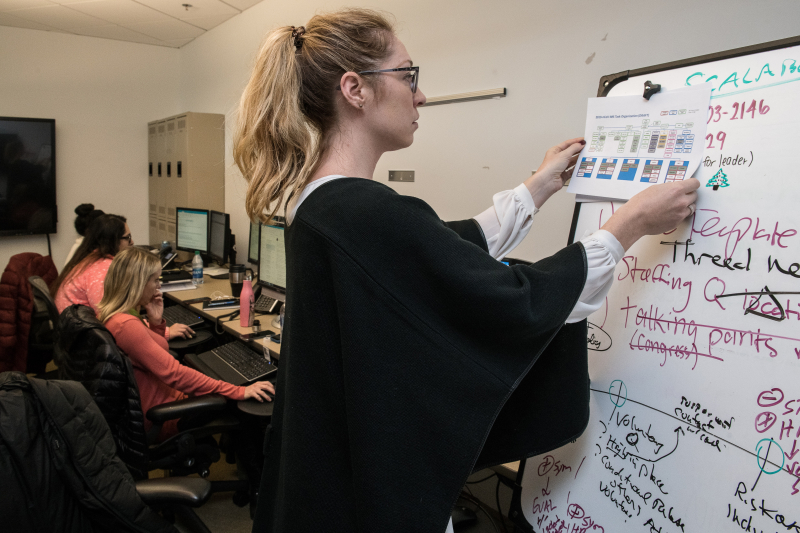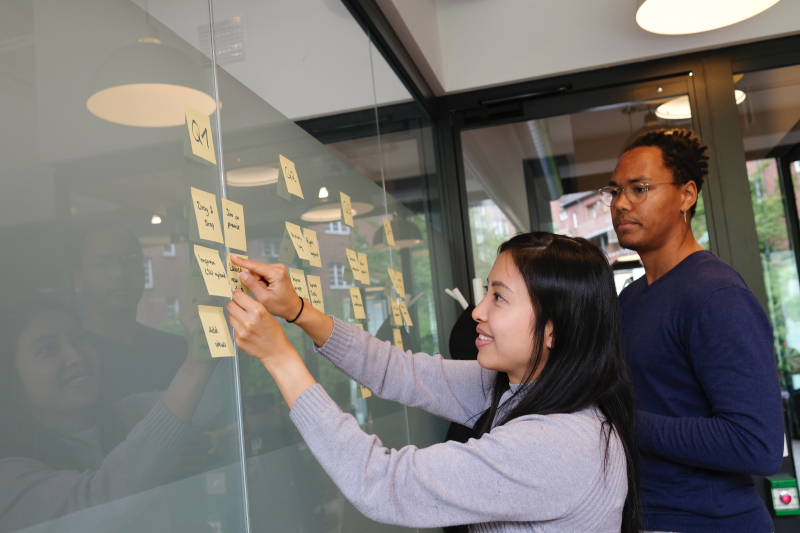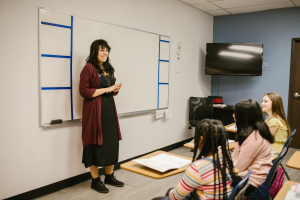Top 17 Most Asked Assistant Principal Interview Questions with Answers
The job interview is one of the most important steps in pursuing a career as an assistant principal in education. To be as prepared as possible for this ... read more...interview, familiarize yourself with the questions that will be asked. If you're interviewing for the position of assistant principal, you should be prepared to answer some common questions. Here are some most asked assistant principal interview questions with answers
-
When interviewing for a position as an assistant principal, your interviewer may ask a question like this to learn more about your motivation for pursuing this important position. Your response can assist hiring managers and other educational leaders in determining whether you are the type of candidate they want to pursue the position. Interviewers are interested in knowing what is important to them and what motivates them. This type of question is also used to assess your potential as a leader.
Prospective employers can learn more about how you might handle the challenges that assistant principals face in guiding students and faculty in a school by listening to you describe your interest in this position. This question can help the interviewer understand why you're applying for this job. They might ask this question to see if you have any personal connections to the area or school because they want to know that you're passionate about working with students and teachers in their school district. Try to explain why you believe this role would be a good fit for you and what you hope to accomplish as an assistant principal at this school in your response.
Answer as an example: "I applied for this job because I have always wanted to work in a school like yours." My favorite subject in high school was history, and I remember how much fun our AP teacher had teaching us. I believe I could channel some of that energy into the classroom and help students learn more about their surroundings. I also enjoy working with children and believe I would make an excellent mentor for new teachers."

Image by Meghan Lamle via unsplash.com 
Image by Christina @ wocintechchat.com via unsplash.com -
The question of what your greatest challenges are is quite common among employers in most industries. Usually, interviewers ask this question because they know that adversity is when you show your true self. Employers will listen carefully to your answers to see how you deal with the challenges, what your problem-solving skills are on different fronts, how resilient you are in the face of adversity, how you can overcome them, and what the results are.
This question can help interviewers understand your priorities for your job and how you intend to address them. When answering this question, it's a good idea to mention a few challenges you've faced in the past and how you overcame them or plan to overcome them in the future.
Answer as an example: "As an assistant principal, the most difficult challenge I've encountered is assisting teachers in finding ways to motivate students while maintaining high expectations for their learning. In my previous position, I worked with several teachers who were attempting to strike a balance between motivating students and establishing clear expectations. I assisted these teachers in developing a system that allowed them to clearly communicate their expectations to students and parents, ensuring that everyone was on the same page."

Image by Adetola Afolabi via unsplash.com 
Image by LinkedIn Sales Solutions via unsplash.com -
When you receive this interview question, you will probably have a lot of ideas for answers. The best way to answer this question is to clearly state your career goals. Because then you will highlight the similarities between you and the position you are applying for. This also helps the employer see that you are a person with direction and effort and appreciate you more. You should show that you have plenty of opportunities to practice and produce the best results for your work. Hobbies and passions are the best means for you to beat your strengths. In addition to stating your goals and expressing your personal passion, you should also show your interest in the job you are applying for. Show them you're willing to work hard to gain experience and hone your skills.
This is your chance to highlight your qualifications and experience. It's critical to be truthful while also demonstrating that you have the skills or characteristics they're looking for in a candidate.
Answer as an example: "As an assistant principal, I believe one of my greatest strengths is communication." I've always been able to communicate clearly with students, teachers, and parents, which has assisted me in resolving many issues before they become bigger issues. Furthermore, I believe my ability to work well under pressure qualifies me for this position. As an assistant principal, I would be expected to assume leadership roles in the absence of the principal, so having these skills will help me succeed.

Image by JESHOOTS.COM via unsplash.com 
Image by Jason Goodman via unsplash.com -
If you want to be a great teacher in the future, you need to have your own teaching philosophy. Your philosophy can be developed over time through your hands-on teaching, education, observation, and research experiences. A philosophy that synthesizes your approach to teaching and can help you in everyday situations that occur in the classroom or workplace. When it comes to sharing your teaching philosophy, it's important to "show" as well as "tell." Give your interviewer a glimpse of your teaching methods by providing detailed examples of your past experiences. Discuss how you have applied your methods as well as the positive results you have achieved through your teaching style.
The interviewer is interested in how you plan and carry out your educational objectives. Each teacher will usually have his or her own teaching method and philosophy. In fact, this will be a difficult teacher interview question to answer, because there will not be a specific answer from an entity for you. Your response should include a few key points about what you value in the classroom, such as student engagement, academic achievement, and teamwork.
Answer as an example: "I believe that every child is entitled to an education that pushes them to reach their full potential." I also believe that students should learn how to collaborate as a team. In my previous position, I initiated a mentorship program in which older students assisted younger students with homework and other assignments. We expanded the program to all grade levels because it was so successful. Students gained valuable skills such as time management and organization, which they will be able to apply throughout their lives."

Image by ThisisEngineering RAEng via unsplash.com 
Image by LinkedIn Sales Solutions via unsplash.com -
Any interviewer can see your formal education on your resume. During an interview, employers will inquire about your educational background to determine how your education has prepared you for the specific responsibilities you will have in the position you are applying for or how your educational experiences will help you fit into the company's culture and work environment. Your educational background can include both formal education and any informal or continuing education you have received over the course of your life.
When answering questions about your education during an interview, it is customary to focus on both your most recent and relevant educational experiences. For example, if you are applying to teach middle school science, you can discuss how your college education specifically prepared you to teach middle school science, but you can also discuss educational experiences such as continuing education courses related to science that you have taken outside of your formal education.
This question can help the interviewer understand your career path and educational progression. When answering this question, it can be beneficial to highlight a few of your most significant accomplishments or skills that helped you succeed in your previous role.
Answer as an example: "As an assistant principal, I was in charge of managing student discipline and overseeing the school's budget." This included collaborating with teachers to develop effective disciplinary policies and ensuring that students followed them correctly. I also collaborated closely with parents to ensure they were aware of their child's progress and any concerns they had about their child's performance. Managing these responsibilities gave me the opportunity to hone my communication and organizational skills."

Image by LinkedIn Sales Solutions via unsplash.com 
Image by Paige Cody via unsplash.com -
Effective leaders can draw on a toolbox full of leadership skills and abilities to guide both their organization and their team members to success. Proper leadership skills training is an excellent way for managers to improve their capabilities, inspire their teams, and achieve outstanding business results. Successful leaders can transform organizations, increase value creation, create efficiencies, and engage their employees to produce better results. Managers can learn how to create a vision for their team and inspire others to achieve it through leadership skills training. They can also learn to delegate tasks, build trust, and deal with conflict.
Assistant principals are frequently called upon to lead a group of teachers and other administrators. Employers ask this question to ensure that you have the necessary skills to be an effective leader. Consider previous leadership training courses you've taken before your interview. Choose one or two that were especially useful to you. Describe how these courses aided you in developing your leadership style.
Answer as an example: "Last year, I took a servant leadership course." This class taught me to always prioritize the needs of my team over my own. It also taught me the importance of listening to everyone's ideas and opinions. I try to accomplish this by encouraging others to share their ideas with me. "People are more likely to support one another when they feel heard, in my experience."

Image by Jason Goodman via unsplash.com 
Image by Kaleidico via unsplash.com -
Disruptive students are a common occurrence in the classroom, and the hiring manager may ask you this question to learn more about your strategies for ensuring that all students have an equal opportunity to learn. The principal of a larger school with larger classes may want to ensure that you can manage disruptions while allowing students to focus on learning. Many students are disruptive for behavioral reasons, and your response may be evaluated by the principal as evidence of your methods for ensuring disruptive students can learn as well.
Assistant principals are frequently required to discipline students, and the interviewer wants to ensure that you know how to do so effectively. When answering this question, explain what steps you took to ensure the student understood why they were being disciplined and that you followed school policy when disciplining them.
Answer as an example: "I once had a student who was constantly disrupting class by engaging in conversation with other students." I invited him to stay after class one day to discuss his behavior. He claimed he didn't realize he was distracting others, so I explained the gravity of his actions and assigned him to write a five-paragraph essay on the importance of listening in class. I returned it to him with a grade after he turned it in and let him return to class."

Image by Priscilla Du Preez via unsplash.com 
Image by Brooke Cagle via unsplash.com -
The interviewer is interested in learning more about your critical thinking abilities. They also want to see that you can make sound decisions using logic. Your response should demonstrate that you are capable and confident in independent thinking and decision-making.
This question may be asked by the interviewer to learn more about your analytical abilities. Use examples from your experience to demonstrate your ability to gather and analyze data, interpret the information you discover, and make decisions based on what you learn.
Answer as an example: "In my current position as an assistant principal, I use data to better understand how students perform in their classes." For example, I examine student grades and attendance records to determine whether there are any patterns or trends that could indicate a problem. I'll contact a student and their parents if I notice a significant change in their performance. In one case, I noticed that a group of students had significantly lower grade point averages than usual. After speaking with them, I discovered that they were struggling due to a lack of textbooks for all of their classes. We collaborated to get them the resources they required."

Image by Tyler Franta via unspalsh.com 
Image by Cathryn Lavery via unsplash.com -
Employers want to hire vice presidents with the ability to manage supply budgets and monitor finances continuously, so it's no surprise when financial statements are released. According to the California College of Human Resources, San Francisco, you can expect interview questions such as "How do you estimate costs and budgets?" or "What experience do you have with long-term and short-term budget forecasts?" These questions help the hiring manager understand the methods and processes you've adopted in previous budgeting positions. Positive past experiences are a good way to estimate future success.
Assistant principals are frequently required to create and manage school budgets. They must also understand how the school's budget affects the budget of their department. This question allows interviewers to learn about your experience managing finances, which is essential for this position. Explain what steps you take when creating a budget and how you use it to support your work in your response.
Answer as an example: "In my previous position as assistant principal, I assisted in the development of the school's annual budget." We used spending data from previous years to determine where we could cut costs while still providing high-quality education. Then we made a new budget that reflected these changes. I also collaborated closely with the principal to ensure that each department received adequate funding to cover its expenses."

Image by krakenimages via únplash.com 
Image by Van Tay Media via unsplash.com -
The purpose of asking an interviewer about your career goals in the coming years is to see what your ideal career is and what you will do in the coming years. From there, the employer will somewhat better understand you—about your orientation in the job, whether it is suitable for the position you are applying for, and whether your commitment to this job will be long-term to bring you the best results. make decision.
This question can assist interviewers in learning more about your values and how you apply them at work. When answering this question, consider a specific lesson that has helped you become a better educator. Don't give a generic, vague answer to this question. You let the employer know clearly what you want and what needs to be done to achieve that desire. This way, you show the interviewer that the position is right for you.
Answer as an example: "The most important lesson I've learned in education is the value of patience with students," for example. As an educator, I understand that students are constantly learning new things, so I try not to get frustrated when they don't understand something right away. Instead, I take the time to thoroughly explain concepts and provide additional resources for students who require additional practice."

Image by Christina @ wocintechchat.com via unsplash.com 
Image by Sebastian Herrmann via unsplash.com -
The more society develops, the more attention is paid to education, and therefore, the building of relationships between subjects also contributes to better results. Not only should teachers behave appropriately with students, but they also have to consider the process of cooperation with parents. This has a significant impact on the teaching process, helping the children learn better and not be affected by negative energy.
Assistant principals are frequently required to collaborate with parents and guardians. They may arrange for parent-teacher conferences, communicate with parents about their children's progress, or address parental concerns. When answering this question, it can be useful to provide a specific example of how you've previously worked with parents.
Answer as an example: "In my current role as an assistant principal, I meet with parents on a regular basis to discuss their child's progress." For example, one student struggled with math last year. I scheduled a meeting with his parents to discuss what they were doing at home to support his learning. We devised some strategies for them to use at home to assist him in improving his grades. He has made significant progress since then.

Image by Austin Distel via unsplash.com 
Image by Campaign Creators via unsplash.com -
Career objectives are targets. Things, positions, and situations in your professional life that you have set your sights on. They can be short-term, such as receiving a promotion or certification, or long-term, such as owning your own successful business or becoming an executive at your dream company. Whatever they sound like, they should be the type of prize that motivates you to get started in your career.
Assistant principals frequently aspire to become principals. Interviewers ask this question to see if you want to advance within their school district. Explain your future goals and how they relate to the job description when answering this question. If you are unsure about the job requirements, it is acceptable to request more information before responding. It can be one of most asked assistant principal interview questions with answer that you should prepare.
Answer as an example: "I am currently working on my master's degree in educational administration." I aspire to be a high school principal one day. My experience as an assistant principal has provided me with valuable insight into what it takes to succeed in that position. I am confident in my ability to excel in this position while working toward my goal."

Image by LinkedIn Sales Solutions via unsplash.com 
Image by LinkedIn Sales Solutions via unsplash.com -
Connecting school and home is hard work. Principals will rely on teachers to maintain communication with parents. Teachers are even seen as “spokesmen” for the school, reinforcing the school's culture, strengths, and values in front of parents. So let's answer this question with specific ideas. Share how parents can be involved in your classroom and how you will maintain regular communication and provide updates on both positive and adverse events. It will be great when teachers share tools and resources with parents to support students.
Assistant principals frequently collaborate with parents to ensure their children's academic success. They may need to develop strategies to encourage parental involvement and academic success among their students. When answering this question, you can describe a specific strategy you used at your previous job to increase parent engagement.
Answer as an example: "I believe that the best way to increase parent involvement is to establish open lines of communication between teachers and parents." In my experience, when parents understand what we expect from their children in the class, they feel more confident in supporting them at home. To accomplish this, I created an online portal where parents could access assignments, communicate with teachers, and receive progress updates on their children.

Image by CDC via unsplash.com 
Image by airfocus via unsplash,com -
Formative assessment is frequently the best way for educators of all ages to determine how well students retain information, whether they understand what is going on, and whether or not their lessons are understandable and comprehensible.
This question may be asked of you by the interviewer to assess your ability to understand the needs of students and their families. Use examples from your work with students and their families to demonstrate your ability to evaluate a variety of factors, such as academic performance, social skills, and family dynamics.
Answer as an example: "I would first look at test scores and other data to see how well our students are performing in school." I would also review student attendance records and speak with teachers about any concerns they have about specific students or groups of students. I'd then meet with parents to discuss these issues and learn about the resources they're using to help their children's education. This data assists me in developing strategies to improve student performance and ensure that all students feel supported."

Image by Daoud Abismail via unsplash.com 
Image by Christina @ wocintechchat.com via unsplash.com -
Most people will have to work as part of a team at some point in their lives. Teams in the workplace require cohesion to function effectively and productively and to achieve their goals. Several best practices promote team cohesion, such as ensuring effective communication among team members and keeping the team motivated.
Assistant principals frequently collaborate with teachers to ensure that students receive a high-quality education. This question is asked by employers to ensure that you understand the value of collaboration and teamwork in school leadership. Explain how you would use your communication skills to collaborate with lead teachers in your response. Give an example of how you have previously collaborated with other educators.
Answer as an example: "I believe that one of the most important aspects of effective school leadership is collaboration." I am confident that by working together, we will be able to provide more opportunities for our students. I've always made it a point to communicate regularly with my lead teachers throughout my career. For example, every week I send out a newsletter to all staff members outlining any upcoming events or schedule changes. This keeps everyone up to date on what's going on at school.

Image by Christina @ wocintechchat.com via unsplash.com 
Image by Christina @ wocintechchat.com via unsplsash.com -
A disciplined classroom is necessary for both students and teachers to succeed. A loud, unruly class with a lack of discipline is not conducive to successful learning, as any teacher will tell you. The key to maintaining a respectful and learning-positive environment is to improve your classroom management skills. A little skill and planning, as well as getting students to understand your expectations and the consequences of their own actions, will pay off in terms of attention span and overall engagement in your lessons.
This question may be asked by the interviewer to assess your experience with campus discipline and how you apply policies. Use examples from your previous experience to demonstrate your ability to work within school policy while still providing a positive learning environment for students.
Answer as an example: "In my current position, I am in charge of dealing with student behavior issues in the classroom." As an assistant principal, I noticed that many teachers were hesitant to address disruptive or disrespectful student behavior because they didn't want to write referrals. To allay these fears, I devised a system of verbal warnings prior to issuing written referrals. This assisted me in establishing rapport with teachers and instilling confidence in my ability to handle disciplinary situations."

Image by LinkedIn Sales Solutions via unsplash.com 
Image by Mimi Thian via unsplash.com -
Because technology is an important part of education, the interviewer may ask you this question to learn more about how you use technology in your classroom. Use examples from your own experience to demonstrate that you understand the value of using technology in learning and teaching.
Technology is at the forefront of education, so the interview is your chance to demonstrate your insights. Talk about why you're excited about using technology with your students. Explain how you have created websites and blogs for students, how you use Google Classroom in class, etc. Creative thinking on the technology platform is always something that principals appreciate.
Answer as an example: "I believe that technology has the potential to be a powerful tool for improving education." I used Google Classroom to create assignments and communicate with students and parents in my previous position as an English teacher. This enabled me to keep track of all student work and grades, making it simple to provide feedback on their progress. It also enabled students to submit assignments digitally, which saved time during grading.

Image by Mimi Thian via unsplash.com 
Image by Jud Mackrill via unsplash.com






































